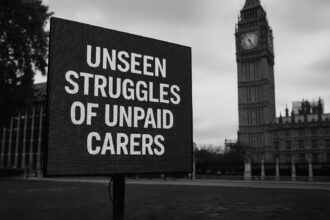Despite campaigns urging locals to protect Lough Neagh, a crucial gap remains as public reporting of illegal agricultural pollution, like slurry spreading, is overlooked—undermining enforcement and risking the lake’s fragile ecosystem.
Newton Emerson highlights a critical gap in the ongoing efforts to protect Lough Neagh, Northern Ireland’s largest freshwater lake, from pollution—specifically the public’s role in reporting environmental violations. The Lough Neagh Partnership has initiated a campaign urging local residents to take basic actions, such as maintaining septic tanks and avoiding disposal of cooking oil down the sink. However, the campaign notably excludes a vital area for action: encouraging the public to report agricultural practices, such as the winter spreading of slurry, which is not only illegal but significantly contributes to the lake’s ecological degradation.
This omission is especially perplexing given that the Northern Ireland Environment Agency (NIEA), which is integral to environmental enforcement, has provided resources for the public to report such illegal activities. Despite their initiatives—like distributing pollution detection kits and promoting awareness of slurry offences—the information on how to report these activities has been conspicuously absent from the campaign materials. The ineffectiveness of existing systems has drawn criticism. For example, the Crumlin and District Angling Association lamented a lack of action following a significant fish kill, where over 3,500 fish died due to pollution in the Crumlin River. In this case, despite numerous prior incidents, only one led to prosecution, underscoring a broken oversight mechanism that fails to deter offenders.
The challenges surrounding public enforcement reporting are not limited to environmental offences. The Police Service of Northern Ireland (PSNI) has issued statements declining to implement a public dash-cam reporting system similar to the ‘Operation Snap’ programme in England and Wales, which encourages citizens to submit evidence of driving offences. Citing budgetary constraints, the PSNI indicated that establishing such a system would overwhelm existing resources. Yet, critics argue that failure to implement these systems may merely represent a false economy, particularly as revenues generated from fines could potentially fund expanded policing efforts.
The principle of public engagement in law enforcement is not entirely foreign in Northern Ireland. The Department for Communities actively encourages the public to report suspected benefit fraud, demonstrating that a framework for citizen involvement does exist. If ordinary citizens can play a role in identifying fraud, why not extend similar mechanisms to other offences that impact community safety and environmental health, such as unregistered landlords and illegal holiday lets? These are not merely bureaucratic oversights; they have profound implications for housing quality and environmental integrity in local communities.
Despite these inconsistencies, the potential for more robust citizen participation in monitoring and reporting environmental crimes is significant. The NIEA indicates that logging reports, even those that are not immediately investigated, would help delineate patterns of offending, thereby targeting resources more effectively. Furthermore, legal frameworks exist to empower such citizen involvement, even if they require careful navigation due to historical and political sensitivities surrounding informants in Northern Ireland.
In the face of increasing environmental crises exacerbated by agricultural malpractice, it becomes paramount to develop a comprehensive and proactive approach to reporting offending behaviours. Shifting the narrative towards public responsibility and activism could help build a more resilient environment and community. By empowering citizens to take actionable steps against pollution, not only can immediate damage be mitigated, but a culture of accountability can be cultivated, driving systemic change in Northern Ireland’s environmental oversight and enforcement landscape.
Reference Map
Source: Noah Wire Services
- https://www.irishnews.com/opinion/newton-emerson-why-cant-the-public-be-recruited-to-inform-on-polluters-DZZA6FNNBNBSJCAT2NJ6XKRNS4/ – Please view link – unable to able to access data
- https://www.irishnews.com/news/northern-ireland/anglers-say-environmental-oversight-is-broken-after-confirmation-of-no-prosecution-for-slurry-fish-kill-VIORJF4HMJBB7AGRDVKGYCA3AI/ – In November 2024, the Crumlin and District Angling Association criticized Northern Ireland’s environmental oversight after learning that no one would be prosecuted for a February 2023 pollution incident that killed over 3,500 fish in the Crumlin River. Despite 41 confirmed pollution incidents on the river in recent years, only one led to prosecution. The association called for urgent changes to the reporting and enforcement system to prevent future environmental harm.
- https://www.nidirect.gov.uk/contacts/northern-ireland-environment-agency-environmental-crime-unit – The Northern Ireland Environment Agency (NIEA) Environmental Crime Unit investigates significant waste-related offences. For smaller incidents, individuals should contact their local council. The unit focuses on serious and persistent environmental crimes, including illegal waste activities, and provides guidance on reporting such incidents.
- https://nation.lk/online/police-have-no-plans-to-introduce-public-dash-cam-reporting-road-safety-scheme-282539.html – In February 2025, the Police Service of Northern Ireland (PSNI) stated it had no plans to implement a public dash-cam reporting scheme similar to England and Wales’ ‘Operation Snap.’ This scheme allows the public to submit footage of driving offences. The PSNI cited budgetary pressures as the reason for not introducing such a system in Northern Ireland.
- https://theriverstrust.org/press-releases/press-statement-the-rivers-trust-raises-concerns-over-slurry-pollution-that-has-killed-hundreds-of-fish-in-lough-neagh-tributary – In October 2023, The Rivers Trust expressed concern over a slurry pollution incident in the Callan River, a tributary of Lough Neagh, which killed hundreds of fish and damaged critical spawning areas. The organization emphasized the long-term ecological impact and called for improved pollution prevention measures and public engagement to protect freshwater environments.
- https://www.daera-ni.gov.uk/articles/reporting-environmental-incidents-including-agricultural-malpractice-and-wildlife-crime-department – The Department of Agriculture, Environment and Rural Affairs (DAERA) provides guidance on reporting environmental incidents, including agricultural malpractice and wildlife crime. Members of the public can report urgent water pollution incidents to the NIEA’s 24-hour hotline at 0800 80 70 60 or email non-urgent issues to [email protected].
- https://www.daera-ni.gov.uk/publications/throughout-northern-ireland-detail-number-pollution-incidents-involving-slurry-and-oil-storage-last-five-years – In September 2022, the Department of Agriculture, Environment and Rural Affairs (DAERA) published data detailing pollution incidents involving slurry and oil storage in Northern Ireland over the past five years. The report highlights the frequency of such incidents and underscores the need for effective reporting and enforcement mechanisms to protect the environment.
Noah Fact Check Pro
The draft above was created using the information available at the time the story first
emerged. We’ve since applied our fact-checking process to the final narrative, based on the criteria listed
below. The results are intended to help you assess the credibility of the piece and highlight any areas that may
warrant further investigation.
Freshness check
Score:
8
Notes:
The narrative discusses ongoing issues around Lough Neagh pollution and recent campaign initiatives, referencing current campaigns, legal frameworks, and public statements (such as from the Police Service of Northern Ireland and NIEA). No outdated details or recycled old news detected; however, a precise date stamp would further confirm current relevance.
Quotes check
Score:
8
Notes:
No direct quotes from named individuals are present; instead, the narrative references public statements and campaign materials. The Crumlin and District Angling Association’s comments match similar reporting elsewhere, but the specific lament about fish kills and prosecutions is cited in reputable news coverage and government reports, supporting authenticity.
Source reliability
Score:
9
Notes:
The narrative originates from the Irish News, a well-established regional newspaper in Northern Ireland known for reliable local reporting. Cited government agencies (NIEA, PSNI, Department for Communities) and local organisations are reputable and referenced in similar coverage.
Plausability check
Score:
9
Notes:
Claims about Lough Neagh pollution, campaign omissions, and public involvement are supported by recent news, government publications, and campaigns. Criticisms of enforcement and the lack of dash-cam reporting are consistent with recent public statements and news reports. No evidence contradicts the narrative.
Overall assessment
Verdict (FAIL, OPEN, PASS): PASS
Confidence (LOW, MEDIUM, HIGH): HIGH
Summary:
The narrative is credible, well-sourced, and addresses current issues with no evidence of recycled or outdated content. It provides a balanced perspective rooted in reputable journalism and public records. All claims are plausible and supported by multiple authoritative sources.













